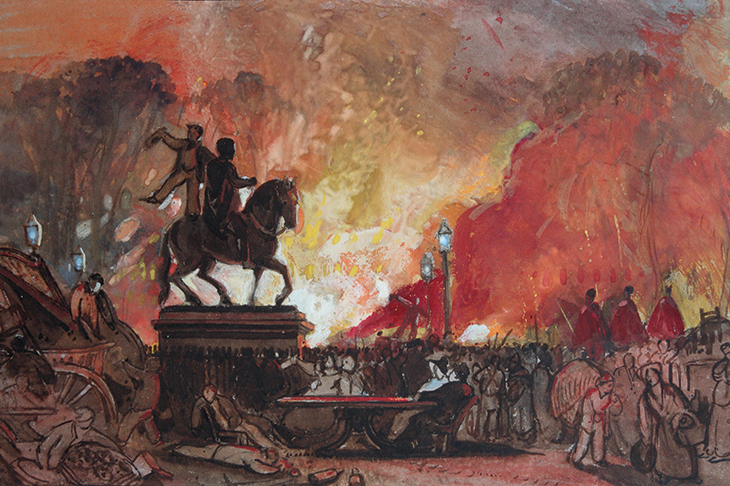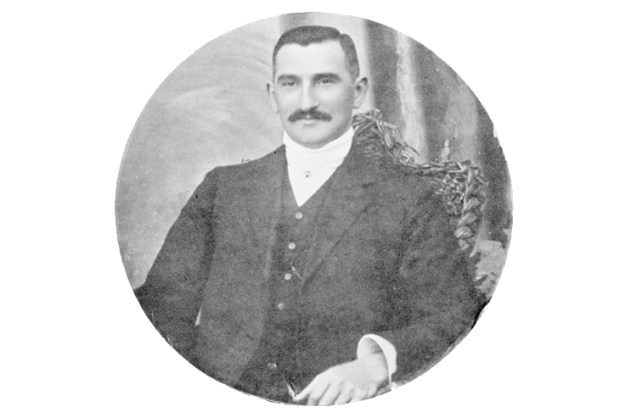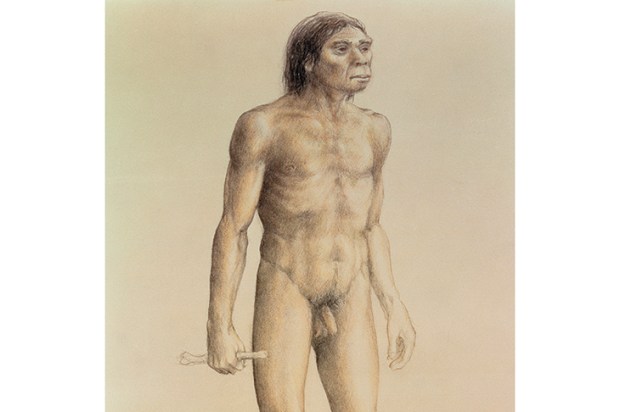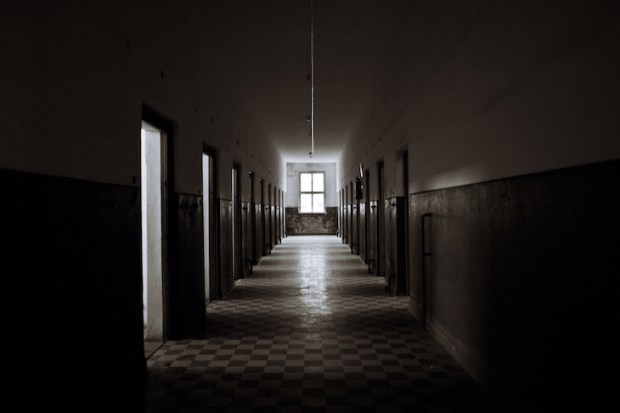David Cannadine was a schoolboy in 1950s Birmingham, which was still recognisable as the city that Joseph Chamberlain had known. In the 1960s the town planners demolished much of Victorian Birmingham. The bulldozing of 19th-century cities coincided with — and helped to cause — a boom in Victorian history, led by Asa Briggs. As a postgraduate student at Cambridge, Cannadine wrote a thesis on Birmingham’s 19th-century aristocratic landowners. Since then, there has been a torrent of academic research on 19th-century history, and this has had a ‘deadening and dampening effect’. The Victorians have gone out of fashion. Historians have migrated to the rich pastures of the 18th century or the newly available archives of the 20th.
So much has been written about 19th-century Britain that a new interpretation seems almost impossible. But in this magnificent Penguin history, Cannadine pulls it off. At first sight the book seems conventional enough. This is a narrative history. It is also a political history. As Cannadine explains, the vital feature of 19th-century Britain was the extraordinary importance of Parliament. Other countries had parliaments, but none were as enduring or as prestigious as Westminster.
Most histories of 19th-century Britain begin in 1815 and end in 1914. Cannadine’s account, by contrast, starts in 1800 with the Act of Union with Ireland, which created the United Kingdom, and ends with the Liberal landslide election of 1906; both dates are landmarks in Britain’s parliamentary history. But this is not a clichéd textbook story of the triumph of democracy and reform. Nor is it an insular, inward-looking narrative of Westminster high politics. There is something else going on here. Cannadine begins his history in the middle of the Napoleonic Wars with France. Throughout the book the story of Britain’s relations with Europe and with its expanding empire is integrated into the narrative of domestic politics. This is a global history, a spellbinding account of Britain’s rise and fall as a great power.
Starting the story in 1800 shifts the conventional perspective. The Act of Union with Ireland, as Cannadine points out, was an expedient forced upon Prime Minister Pitt by the war with France. It seemed the only way to prevent a rebellion in Ireland or a French invasion. It pleased none of the Irish. Nor was the Younger Pitt’s strategy of fighting the French by defeating them at sea, and financing coalitions of the continental powers on land, a success. The co-alitions always broke apart and Napoleon’s domination of the land seemed comprehensive. Not until Pitt had fallen did Britain begin to win.
The Napoleonic War of 1803–14 was the only major conflict in recent history where Britain had no strong political leader; merely a succession of mediocre prime ministers. These included Spencer Percival, the only British PM to be assassinated, and the second-rate Addington (‘Pitt is to Addington/As London is to Paddington’) — though Cannadine reckons that the latter has been much underestimated. The war was a triumph for Britain’s military-fiscal state. It was financed by massive borrowing, made possible by a buoyant wartime economy and a sophisticated banking system. Military success was enabled by the efficiency of the Whitehall bureaucrats, overseeing ships, weapons and supplies. For France, by contrast, the war was an economic disaster. The result was that Britain, whose future had seemed in the balance in 1800, emerged in 1815 as the strongest and richest power in the world.
The 1830s was the hinge decade. As every schoolboy used to know (but doesn’t any more), the Whig government under Lord Grey bowed to the people and pushed through the Great Reform Bill. This was the prelude to a decade of reform, of sustained legislative engagement with contemporary issues, which was something entirely new. It marked the end of the old military-fiscal state and the beginning of the so-called age of improvement. Overseas, this was a pivotal decade too. European peace coupled with the opening of new markets in China and Latin America offered unprecedented opportunities for trade and investment. The UK was more engaged with the world than ever before.
In 1848 the historian Macaulay declared that the history of England was ‘essentially the history of physical, of moral and of intellectual improvement’. The Great Exhibition of 1851 was a defining moment, celebrating Britain’s material progress. But, as Cannadine shows — and this is a major theme — for every Macaulayan self-congratulatory optimist, there was a doom-laden Matthew Arnold, wracked with doubt and wringing his hands. The backwardness of Britain’s education by comparison with its European neighbours was much bemoaned (as it is today), and so was the rise of overseas competitors.
The most extraordinary part of the story was not visible to contemporaries. Industrial supremacy gave the United Kingdom a global hegemony, which was at its zenith in the 1850s and 1860s, but Britain’s wealth didn’t translate into military might. At home, governments came under constant pressure to reduce defence spending, and the British army was by far the smallest of all the European great powers. The price of parliamentary government was an empire on a shoestring. It’s a miracle that the Victorians managed to hold on to their empire.
So how did they do it? One way was by devolving power to white settlement colonies, many of which were granted self-government in the 1850s. The 1857 Indian Mutiny or Great Rebellion was the most significant crisis of the 19th-century British empire: the stakes ‘were at least as high as they had been at the Battle of Waterloo’, says Cannadine, and it too was a close-run thing. Afterwards, the Brits economised by ruling India in collaboration with the traditional elites.
The Second Reform Act of 1867 created an electoral system where ‘the Liberals would need the votes on the margins to enable them to dominate England, whereas the Conservatives would use their powerbase in England to try to dominate the UK’. This, as Cannadine observes, explains Gladstone’s preoccupation with Ireland, which was an attempt to buy Irish votes and undercut the nationalists by offering reforms. Gladstone’s attempts to conciliate Ireland, culminating in his conversion to Home Rule, failed. Also unsuccessful were his attempts to repair the weaknesses of the mid-Victorian state with education bills and civil-service and military reform. Cannadine has little time for Disraeli, though he gives his government credit for what in the long run was a truly significant piece of legislation, though few thought much of it at the time: the 1867 Canadian Confederation Act, which welded Canada into a vast, land-based nation bordering America, effecting a major geopolitical reorientation.
By the 1880s the signs of decline were clear. Britain still accounted for 23 per cent of world manufacturing output. But in Ireland (and to a lesser extent Scotland and Wales), nationalists were fighting a land war and the Union was under strain, while Germany and the US were powering ahead of the British economy. During the second government of the anti-imperial Gladstone, Britain occupied Egypt, and gained further African territory at the Congress of Berlin, but this expansion was defensive and pessimistic. It was soon to lead to imperial overstretch, when the British found themselves in possession of an empire which, even on shoestring economics, they couldn’t afford.
Kipling’s ‘Recessional’, written at the time of Queen Victoria’s Diamond Jubilee in 1897, articulated the mood. ‘Even though the foundations had been in some ways fragile and fortuitous,’ writes Cannadine, ‘the nineteenth century had “belonged” to the United Kingdom more than to any other power, and as it ended there was serious concern, which turned out to be well-founded, that the twentieth century would “belong” elsewhere.’ Britain’s humiliating performance in the Boer War, when 450,000 imperial troops took three years to subjugate 60,000 Boer soldiers, rubbed home its failings. There followed an episode of self-doubt and the abandonment of Britain’s policy of splendid isolation.
This is a thumping great book, and it is probably destined to become a classic. Cannadine writes long sentences and his paragraphs go on for a page or more, but there is something hypnotic and compelling about his majestic delivery. Extraordinarily for a history book there are no footnotes. Only a historian at the very top of his game can do that and get away with it, and Cannadine succeeds triumphantly.
Got something to add? Join the discussion and comment below.
Get 10 issues for just $10
Subscribe to The Spectator Australia today for the next 10 magazine issues, plus full online access, for just $10.
You might disagree with half of it, but you’ll enjoy reading all of it. Try your first month for free, then just $2 a week for the remainder of your first year.














Comments
Don't miss out
Join the conversation with other Spectator Australia readers. Subscribe to leave a comment.
SUBSCRIBEAlready a subscriber? Log in